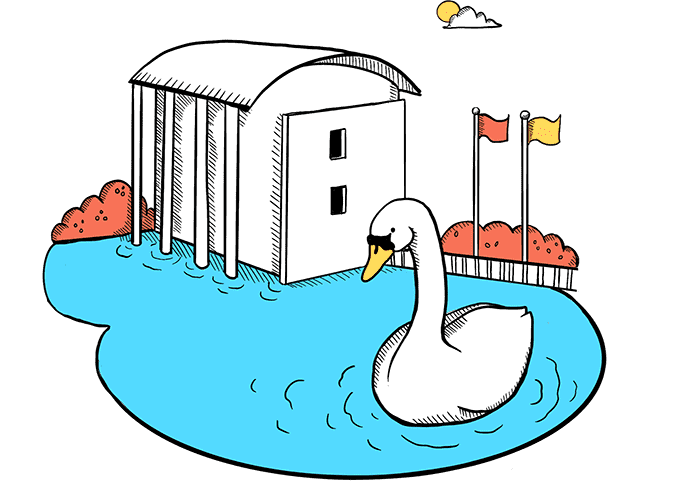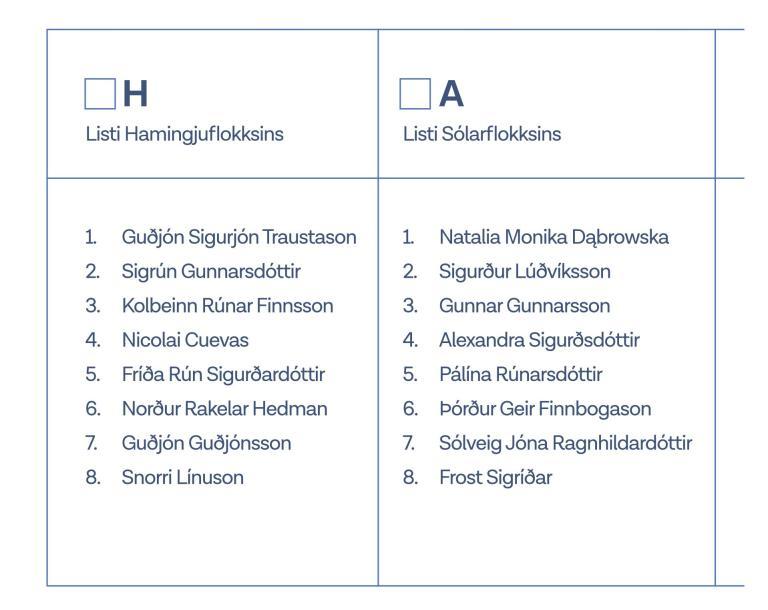Elections and democracy

Guidelines for participating in elections.
Table of Contents
1. Democracy
- Iceland has democracy.
- Democracy means we all influence society.
- For example, democracy means people elect Alþingi members or the president.
- Democracy can also occur in schools and organizations.
- Democracy also means people can influence decisions of those in power.
2. Political parties, candidates and eligibility
- Political parties consist of people with similar ideas about laws and society.
- Political parties have different opinions on taxes and funding for schools, hospitals, and other public services.
- You can vote for political parties in Alþingi elections (see section 4) and local elections (see section 8).
Candidates
- Political parties include people who want to work in Alþingi or local governments.
- These people are called candidates.
- Candidates want to work for the nation or their municipality.
- Examples of municipalities are: Reykjavík, Akureyri, Ísafjörður
- You can learn about political parties and candidates on their websites or in newspapers.
- You can also meet and talk with them.
- Political parties usually advertise when you can meet candidates.
- You can also send an inquiry to party email addresses.
- You can participate in deciding which candidates make party lists.
- This often requires joining the political parties, but rules may vary between parties.
Eligibility
- Eligibility refers to the right to run in elections.
- If you can vote in Icelandic elections and have a clean record, you can run in elections. A clean record means not having a serious criminal conviction.
3. Alþingi, government, and ministers
- Members of parliament work in Alþingi
- Alþingi members are people in political parties we can elect to parliament.
- In Alþingi, members discuss education, housing, healthcare, and other important national issues.
- Alþingi makes laws in Iceland about all matters it addresses.
Government
- The government forms after parliamentary elections. In Iceland, parties that collectively received a majority of votes usually form the government.
- Governing parties often agree on key societal issues.
Ministers
- Parties forming the government choose ministers responsible for different societal matters.
- For example, Minister of Health and Minister of Justice.
4. Alþingi elections
- All Icelandic citizens aged 18 and over can vote in Alþingi elections.
- You can vote for any party you want. You have the right to keep your vote secret.
- You can only vote for one political party in each election
What am I voting for?
- In Alþingi elections, you vote for which political party you want in Alþingi.
- In Alþingi elections, you can vote for parties with different views on healthcare and education systems.
Where do I vote?
- Polling stations are in many locations across the country. Your polling station depends on where you live.
- You need to bring ID to the polling station. ID is a document with a photo and other information. Examples of ID are passports and national ID cards.
5. President of Iceland
- The president is Iceland's head of state.
- The president should unite the nation.
- The president cannot create new laws alone, but if Alþingi approves new laws, the president can refer them to a national referendum.
- The president represents Iceland to people from other countries
- The president regularly meets presidents of other countries, kings, queens, and others.
- The president awards the Order of the Falcon annually. People receiving the Order of the Falcon include those who have excelled in their work for many years.
6. Presidential elections
- All Icelandic citizens aged 18 and over can vote in presidential elections.
- You can only vote for one candidate in each presidential election.
Where do I vote?
- Polling stations are in many locations across the country. Your polling station depends on where you live.
- You need to bring ID to the polling station. ID is a document with a photo and other information. Examples of ID are passports and national ID cards.
7. Local authorities
What is a local authority?
- Every town and city in Iceland has a local authority. In Reykjavík, the local authority is the Reykjavík City Council.
- The Mayor is the City's executive director, appointed by the City Council.
What do local authorities do?
- Local authorities decide where buildings should be located in the city, such as apartments, swimming pools, and sports fields.
- Local authorities also manage primary school and preschool matters.
- Local authorities also manage services for disabled people and older adults.
8. Local elections
- All Icelandic citizens aged 18 and over can vote in local elections.
- If you have Danish, Finnish, Norwegian, or Swedish citizenship, you can also vote in local elections if you are 18 or older.
- You also need to be legally domiciled in the municipality where you want to vote.
- If you have citizenship from another country, you can also vote in local elections if you have been legally domiciled in Iceland continuously for three years before the election.
- You also need to be 18 or older and legally domiciled in the municipality where you want to vote.
- You can vote for any party you want. You have the right to keep your vote secret.
- You can only vote for one political party in each election.
Where do I vote?
- Polling stations are in many locations across the country. Your polling station depends on where you live.
- You need to bring ID to the polling station. ID is a document with a photo and other information. Examples of ID are passports and national ID cards.
9. Assistance with voting
You can get help voting in all elections if you need assistance due to disability
You can get help voting from the polling officer or an assistant who accompanies you to the polling station.
An assistant can be a parent, sibling, or partner, for example.
The voter's assistant signs a confidentiality agreement. This means the assistant cannot tell others how you voted. 25 Rights protection officers for disabled persons are people you can talk to if you need help voting. You can find information about rights protection officers at www.rettindagaesla.is.
10. At the polling station
The polling station is where you go to vote. When you arrive at your polling station, staff can provide information about where to vote. The polling station is divided into several polling wards.
In your polling ward, staff will give you a ballot and direct you to a voting booth where you cast your vote. 27
Inside the voting booth are pencils and a paper with names of political parties and candidates.
You go into the voting booth and mark an X next to the political party you want to vote for on your ballot. If you have an assistant with you, they can help you mark an X on the paper.
When you finish voting, you leave the voting booth and put your vote in the ballot box.
Sample ballot
11. Advance voting
If you cannot vote on election day, you can vote earlier. This is called advance voting.
District commissioners advertise where and when advance voting takes place.
You need to show ID when you vote in advance.
ID includes driver's licenses or passports.
You will receive a ballot and an envelope
In the voting booth, there are either pencils or stamps for the parties running.
You need to go into a voting booth and write or stamp the letter of the party you want to vote for on the ballot.
(Remember you can get help voting - see section 9).
Then you put the vote in the envelope, seal it, and take it to the polling officer.
Finally, you put the vote in the ballot box.
